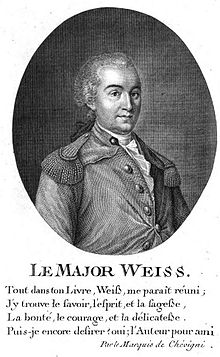François Rodolphe de Weiss
François Rodolphe de Weiss , often also Franz Rudolf von Weiss (contemporary also Weiss or Wyss ; * May 6, 1751 in Yverdon-les-Bains , † July 21, 1818 in Coppet ) was a Swiss politician , writer and officer .
Life
Weiss was a legitimate illegitimate son of François-Rodolphe von Weiss, Lord von Daillens . He went to the military early. From 1766 he served in French and from 1777 in Prussian services. During this time he was promoted to colonel as an officer . Previously, he, who had already won eleven duels, was briefly imprisoned in 1775 due to a love affair. In 1781, during a troubled time, he went to Geneva and was briefly imprisoned again at the Aarburg .
In 1785 Weiss published Principes philosophiques, politiques et moraux, a highly regarded work, and became a member of the Bernese Grand Council . The work aroused the displeasure of the Catholic official church and was later placed on the index by decree of the Congregation for the Doctrine of the Faith in 1827 . He was also the administrator of the Upper Bailiwick of Zweisimmen . He must have been convincing in his administration, because in 1787 he was appointed city commander of Bern . Nevertheless, he kept looking for rebellious activities. In 1789 he went to Paris to observe the revolutionary events . After his return, he was noticed by statements that were too open, which is why he was expelled from the Grand Council for two weeks and placed under house arrest. As a supporter of the revolutionary ideas, however, he was sent again to Paris in 1792, where he now campaigned for peace between France and Switzerland. In 1793 he was in command of the Bern contingent in the border defense at Basel , and in the same year he was elected Bailiff of Moudon . Here the population received him as a peace-bringer with a solemn reception. In 1796 he was sent again to Paris, from there he came to London and back to Paris.
Weiss, still bailiff of Moudon, was appointed general in Vaud on January 12, 1798, not without hesitation . He was supposed to put down the revolutionary machinations, but failed and fled to the German lands, to the Breisgau. He lost a large part of his fortune as a result. From there he returned in 1800/1801. He tried to continue to participate in the discourse with justification and pamphlets, but evidently got further and further sidelined. His last political activity is guaranteed in 1802.
Weiss committed suicide in an inn on July 21, 1818 . At this point in time he probably no longer had a permanent residence.
Works (selection)
- Principes philosophiques, politiques et moraux , 2 volumes, Maradan, Paris 1789 (previously published in Switzerland in 1785, divided into three volumes in later editions).
- Coup-D'Oeil Sur Les Relations Politiques Entre La République Française Et Le Corps Helvétique , Medart, Paris 1793.
- Reveillez-vous Suisses, le danger approche , Franoy, Loyn 1798.
- Du début de la révolution en Suisse, ou défense du cidevant général de Weiss contre ses détracteurs , 1799 (German Nuremberg 1799).
literature
- Emil Blösch : Weiss, Franz Rudolf (from) . In: Allgemeine Deutsche Biographie (ADB). Volume 41, Duncker & Humblot, Leipzig 1896, p. 582 f.
- Johannes Strickler : Franz Rudolf von Weiß . In: Collection of Bernese Biographies , Volume 5, Francke, Bern 1905, pp. 327–343.
- Elisabeth Bastide-Kastl: François Rodolphe de Weiss. In: Historical Lexicon of Switzerland . October 11, 2013 , accessed July 7, 2019 .
Web links
- Works by and about François Rodolphe de Weiss in the German Digital Library
- François Rodolphe de Weiss in the digital portrait index
- François Rodolphe de Weiss on bernergeschlecht.ch
Individual evidence
- ↑ Jesús Martínez de Bujanda , Marcella Richter: Index des livres interdits: Index librorum prohibitorum 1600–1966. Médiaspaul, Montréal 2002, p. 938: WEISS, Franz Rudolf von (1751-1802). ISBN 2-89420-522-8 (French, digitized version )
| personal data | |
|---|---|
| SURNAME | Weiss, François Rodolphe de |
| ALTERNATIVE NAMES | White, Franz Rudolf von; Wyss, Franz Rudolph |
| BRIEF DESCRIPTION | Swiss politician, writer and officer |
| DATE OF BIRTH | May 6, 1751 |
| PLACE OF BIRTH | Yverdon-les-Bains |
| DATE OF DEATH | July 21, 1818 |
| Place of death | Coppet |
